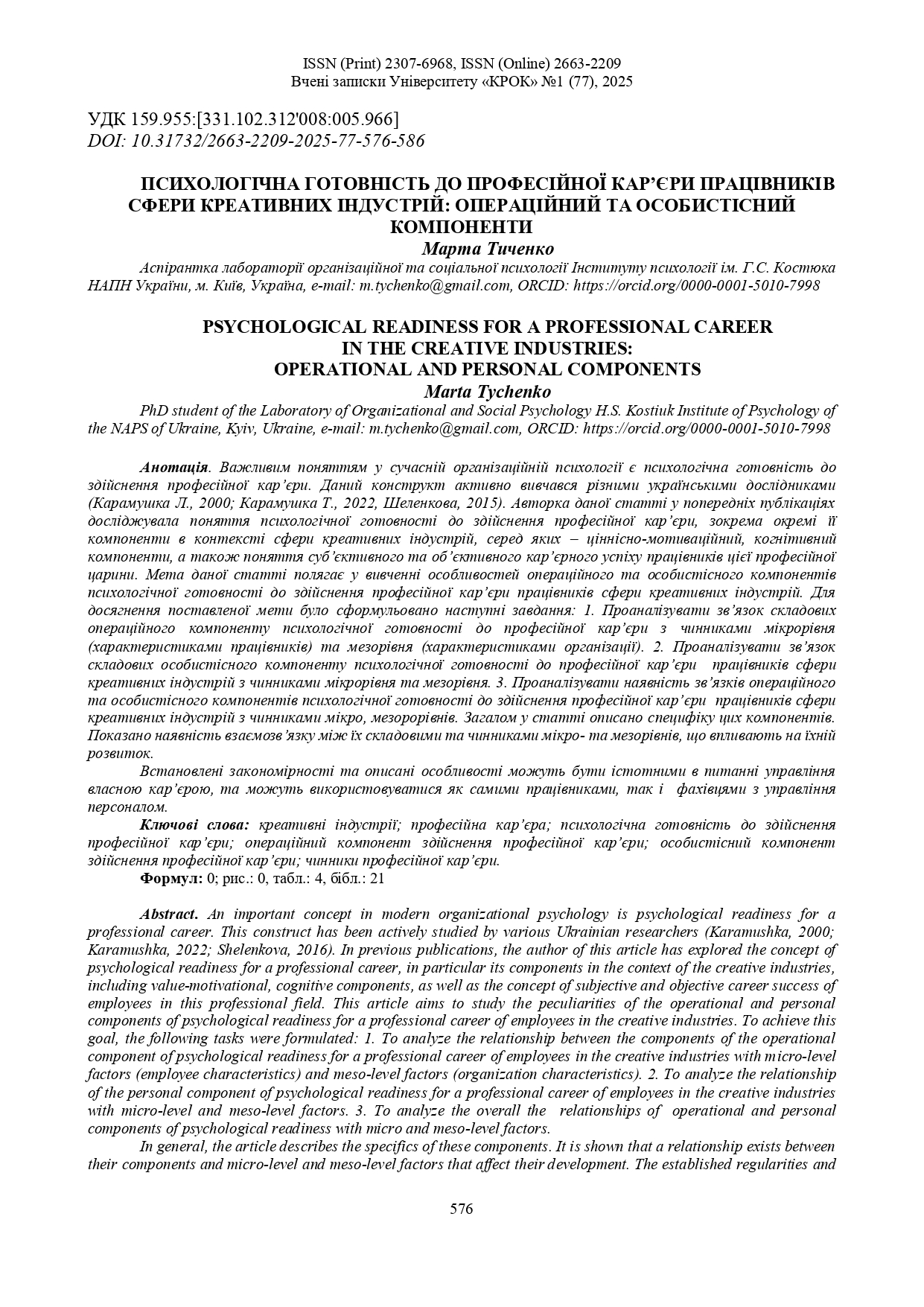PSYCHOLOGICAL READINESS FOR A PROFESSIONAL CAREER IN THE CREATIVE INDUSTRIES: OPERATIONAL AND PERSONAL COMPONENTS
DOI:
https://doi.org/10.31732/2663-2209-2025-77-576-586Keywords:
creative industries, professional career, operational component of professional career, personal component of professional career, psychological readiness for professional career, factors pf professional careerAbstract
An important concept in modern organizational psychology is psychological readiness for a professional career. This construct has been actively studied by various Ukrainian researchers (Karamushka, 2000; Karamushka, 2022; Shelenkova, 2016). In previous publications, the author of this article has explored the concept of psychological readiness for a professional career, in particular its components in the context of the creative industries, including value-motivational, cognitive components, as well as the concept of subjective and objective career success of employees in this professional field. This article aims to study the peculiarities of the operational and personal components of psychological readiness for a professional career of employees in the creative industries. To achieve this goal, the following tasks were formulated: 1. To analyze the relationship between the components of the operational component of psychological readiness for a professional career of employees in the creative industries with micro-level factors (employee characteristics) and meso-level factors (organization characteristics). 2. To analyze the relationship of the personal component of psychological readiness for a professional career of employees in the creative industries with micro-level and meso-level factors. 3. To analyze the overall the relationships of operational and personal components of psychological readiness with micro and meso-level factors.
In general, the article describes the specifics of these components. It is shown that a relationship exists between their components and micro-level and meso-level factors that affect their development. The established regularities and described peculiarities can be significant in managing their career and can be used both by employees and by HR professionals.
Downloads
References
Карамушка, Л. М. (2000). Психологія управління закладами середньої освіти: монографія. Ніка-центр.
Карамушка, Л. М., & Тиченко, М. Є. (2023a). Методики дослідження психологічних особливостей професійної кар’єри. Інститут психології ім. Г. С. Костюка НАПН України.
Карамушка, Л. М., & Тиченко, М. Є. (2023b). Особливості ціннісно-мотиваційного компоненту психологічної готовності до здійснення професійної кар’єри працівників сфери креативних індустрій. Організаційна психологія. Економічна психологія, 30(4), 66-83.
Карамушка, Т. В. (2022) Психологічна кар’єра аспірантів. Видавець Вікторія Кундельська.
Кокун, О. М. (2020). Професійна життєстійкість особистості: аналіз феномена. Актуальні проблеми психології: Психофізіологія. Психологія праці. Експериментальна психологія, 20(5), 68-81.
Сингаївська, І. В. (2015). Особистісні якості викладача як передумова його професійної успішності. Організаційна психологія. Економічна психологія, 2, 86-93.
Тиченко, М. (2024a). Особливості операційного компоненту психологічної готовності до здійснення професійної кар’єри працівників сфери креативних індустрій. У Н. Кулаєва, Л. Корват, В. Петренко (Ред.). IV Всеукраїнська науково-практична конференція «Економічна поведінка молоді: конструктивні форми та девіації». (с. 151-156). Київський національний економічний університет імені Вадима Гетьмана.
Тиченко, М. (2024b). Особливості операційного компоненту психологічної готовності до здійснення професійної кар’єри працівників сфери креативних індустрій. VI Міжнародна конференція «Держава, регіони, підприємництво: інформаційні, суспільно-правові, соціально-економічні аспекти розвитку». «Університет економіки та права «КРОК».
https://conf.krok.edu.ua/SRE/SRE-2024/paper/view/2435
Шеленкова, Н. Л. (2015) Розвиток у майбутніх психологів готовності до здійснення професійної кар’єри. Акварель.
Betz, N. E., & Hackett, G. (2006). Career self-efficacy theory: Back to the future. Journal of career assessment, 14(1), 3-11.
Brusokas, A., & Malinauskas, R. (2014). Career self-efficacy among Lithuanian adolescents in sports schools. Procedia-Social and Behavioral Sciences, 116, 212-216.
Day, R., & Allen, T. D. (2004). The relationship between career motivation and self-efficacy with protégé career success. Journal of vocational behavior, 64(1), 72-91.
DiLiello, T. C., & Houghton, J. D. (2008). Creative potential and practised creativity: Identifying untapped creativity in organizations. Creativity and Innovation Management, 17(1), 37-46.
Grant, A. M. (2001). Rethinking psychological mindedness: Metacognition, self-reflection, and insight. Behaviour Change, 18(1), 8-17.
Hirschi, A., Freund, P. A., & Herrmann, A. (2014). The career engagement scale: Development and validation of a measure of proactive career behaviors. Journal of career assessment, 22(4), 575-594.
Kossek, E. E., Roberts, K., Fisher, S., & Demarr, B. (1998). Career self-management: A quasi-experimental assessment of the effects of a training intervention. Personnel Psychology, 51, 935–962.
Lu, S., Au, W. T., Jiang, F., Xie, X., & Yam, P. (2013). Cooperativeness and competitiveness as two distinct constructs: Validating the Cooperative and Competitive Personality Scale in a social dilemma context. International Journal of Psychology, 48(6), 1135-1147.
Maggiori, C., Rossier, J., & Savickas, M. L. (2015). Career adapt-abilities scale–short form (CAAS-SF) construction and validation. Journal of career assessment, 25(2), 312-325.
Nilforooshan, P., & Salimi, S. (2016). Career adaptability as a mediator between personality and career engagement. Journal of Vocational Behavior, 94, 1-10.
Silvia, P. J., & Phillips, A. G. (2011). Evaluating self-reflection and insight as self-conscious traits. Personality and Individual Differences, 50(2), 234-237.
Silvia, P. J. (2022). The self-reflection and insight scale: Applying item response theory to craft an efficient short form. Current Psychology, 41(12), 8635-8645.

Downloads
Published
How to Cite
Issue
Section
License

This work is licensed under a Creative Commons Attribution-NonCommercial 4.0 International License.

